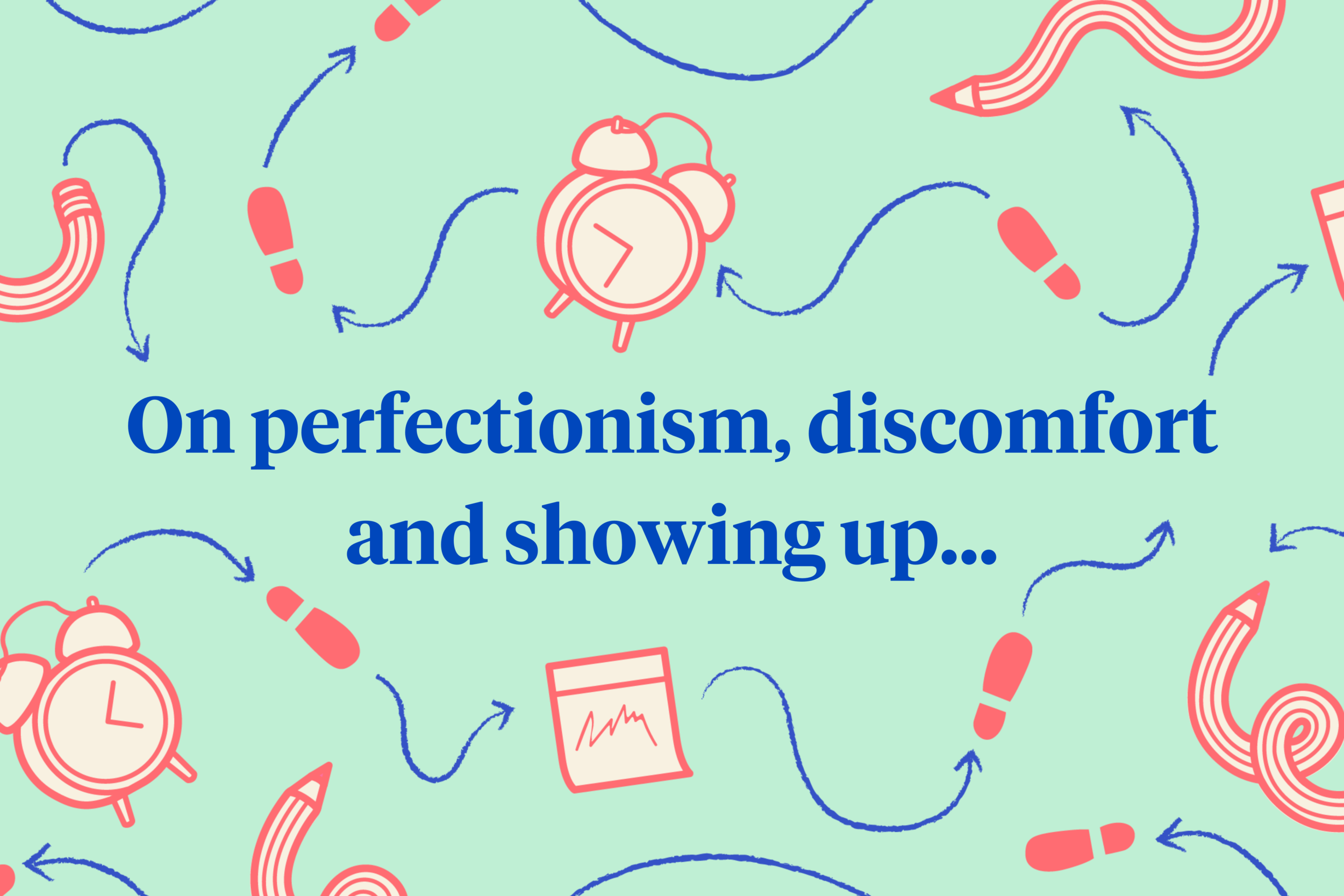On perfectionism, discomfort and showing up
Words by Madeleine Dore
To wrap the first season of Routines & Ruts podcast, I wanted to share some lessons on the thing that almost prevented it from ever getting started – perfectionism. But as I wrote and as the days unfolded, I realised these lessons pertain to much more than our creative lives – they pertain to our entire lives.
This season of Routines & Ruts has spanned unprecedented bush fires in Australia, unprecedented and varying changes to our daily lives due to a global pandemic, and now unprecedented global attention towards systemic oppression, white supremacy and racism, and the rising up of the #BlackLivesMatter movement, which here where I am has importantly translated to talk about the unjust treatment of Indigenous Australians.
Such events, such systems, are intertwined with our routines, with our daily rhythms and inevitable stumbles. No matter whether you benefit from white privilege or you are oppressed by it, it impacts our routines, and our ruts.
In the same way perfectionism can stall progress in our creative lives, it can stall progress in our societies. We cannot move forward, we cannot unlearn, we cannot change, if we allow fear to stifle us into inaction, silence, and denial.
As Ibram X Kindi writes in his book, How To Be an Antiracist, “Denial is the heartbeat of racism, beating across ideologies, races, and nations. It is beating within us.”
To address our own implicit or explicit denial, it can be helpful for some of us to address our own perfectionism.
““In the same way perfectionism can stall progress in our creative lives, it can stall progress in our societies. We cannot move forward, we cannot unlearn, we cannot change, if we allow fear to stifle us into inaction, silence, and denial.” ”
As a privileged white woman living in Australia, I bring the lens of learning to be actively anit-racist and inspecting my own whiteness. But many of you may not identify with this lens – for some of you racism is a lived experience.
For others, you may also be listening, unlearning, encountering missteps or not knowing where to start for fear of saying or doing the wrong thing. I don’t have the answers on where to start because we are all at different points, with different lenses and different privileges be it education, access, health, and so on, but I do acknowledge that we all face what is at the root of perfectionism, in varying degrees and severity in our lives – and that is fear.
Time and time again, I share how important it is to start small, start anyway, learn, make mistakes, try again, be patient. These lessons move beyond our creative lives because our creativity is connected to us as human beings in the world – to our conversations, to relationships, to our businesses, to our personal growth, to our mental health, to our learning and unlearning, and to the systems we benefit from, or are oppressed by. Creativity is interlinked to our humanity – it helps us take off the blinders we might be wearing, and helps us inspect, and connect.
So to wrap season one of the podcast, I share a non-exhaustive list of parallel lessons that speaks to what I do know about creativity, while also sharing Black and Indigenous voices.
The lessons might apply to your ongoing engagement with being anti-racist or an activist, or they might apply to your creative process, or your career, or your life, your relationships, or your environmental efforts, your scrutiny of yourself, your need for rest, your showing up in the world. Most of all, I hope they are helpful in highlighting that anything we want to do or change, begins with sidestepping perfectionism, fear, and shame. It begins with us taking responsibility for ourselves and our actions.
““You’re trying to undo centuries of social programming and systemic privilege – trying to create actual change – so yes, it should be painful. There should be tears. There should be grief and guilt. There should be shouting and bad words and silence. There should be wariness, even at the best of intentions.”
– Scott Woods, author and poet”
Mentioned links
How To Be Anti-Racist by Ibram X Kendi
Akilah Hughes piano metaphor and What A Day podcast
Instagram story by author, podcaster, and CEO of Hello Seven Rachel Rodgers
Me and White Supremacy book by Layla F Saad
Anti-racism work is supposed to be hard by Scott Woods
Ibram X Kendi on Unlocking Us with Brene Brown
Interview with Dom Roberts on Mood with Lauren Elizabeth
“The internal work, the integrating and rearranging and and re-educating our psyches and hearts, that’s the hard work, that’s the work nobody will hold you accountable for. Do that too. Do that the most…” – Kendra Austin
Interview with Luke Currie Richardson on Routines & Ruts
Additional links
A Small Needful Fact poem by Ross Gay
How do you measure a life? School of Visual Arts 2016 commencement address by Carrie Mae Weems
White Debt essay by by Eula Biss
Remember, no one is coming to save us essay by Roxanne Gay
‘There cannot be 432 victims and no perpetrators…’ essay by Amy McQuire
Include Aboriginal culture as a subject in schools change.org petition
Routines & Ruts podcast is produced and edited by Madeleine Dore using Hindenburg.
Special thanks to Nelson Dore for the theme music and Ellen Porteus for the cover art.

